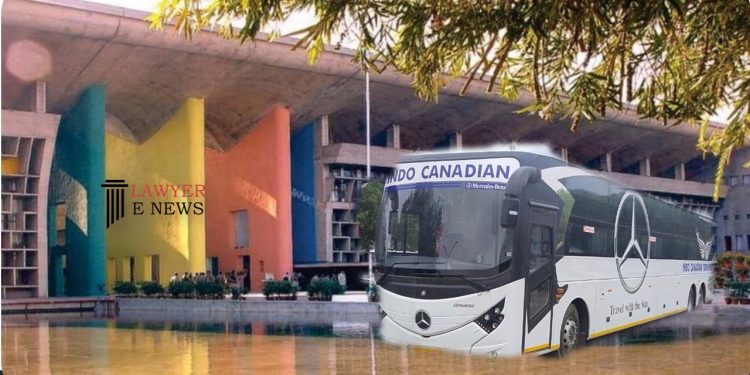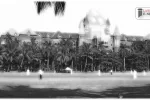Court favors Indian Canadian Transport Co, cites authorities’ U-turn on passenger contracts.

P&H High Court (Indian Canadian Transport Company Vs State of Punjab & Oth. D.D 07 Feb 2023) observed that the respondent authorities have taken a U-turn in their stand on the petitioner’s entitlement to take up individual passengers by having separate contracts with them. This is contrary to their earlier stand taken in the impugned order dated 07.01.2022 and shows malafide of the respondent authorities to harass the petitioner.
The petitioner has filed a writ petition under Article 226/227 of the Constitution of India to quash the orders passed by the State Transport Appellate Tribunal and the State Transport Authority cancelling the permits of the petitioner’s contract carriage tourist buses. The petitioner alleges that the cancellation was done in violation of the provisions of the Motor Vehicles Act, 1988 and Rules framed thereunder and the All-India Tourist Vehicles (Authorization or Permit) Rules, 2021.
Facts
The petitioner is a company incorporated under the Companies Act that runs contract carriage tourist buses for tourists and NRIs on the Amritsar Indira Gandhi International Airport, New Delhi route, based on permits and authorizations granted under the Motor Vehicles Act, 1988 and Rules framed thereunder. The petitioner has a licence agreement with Delhi International Airport Limited (DIAL) to set up and manage a bus picking counter for the entire licence terms at Indira Gandhi International Airport, New Delhi.
The petitioner was granted E-recognition as an Approved Tourist Transport Operator by the Ministry of Tourism, Government of India, which is valid up to 11.03.2026. This recognition is in respect of three buses, two of which have been granted authorization certificates enabling them to operate throughout India, and the third bus has been granted an authorization certificate in accordance with Rule 4(4) of 2021 Rules.
The petitioner prepared a passenger list containing details such as name, origin, destination, and contact/boarding point before the journey in compliance with Rule 11 of 2021 Rules. However, on 18.12.2021, the then Transport Minister and enforcement staff stopped the petitioner’s buses on the allegation that they were being run as stage carriages, and a show cause notice was issued on 23.12.2021.
The show cause notice contained allegations without supporting documents, and despite the petitioner’s request for the documents to furnish a detailed reply, none were supplied. The respondent No.3 proceeded ex parte and cancelled the permits under Section 86 of the Motor Vehicles Act, 1988, citing a violation of permit terms and conditions. The petitioner filed an appeal under Section 89 of the Motor Vehicles Act, 1988 on 31.01.2022, assailing the impugned order and show cause notice for being violative of 2021 Rules.
The appeal was dismissed on 27.04.2022, and the respondent No.2 held that the petitioner was using its vehicles as a stage carriage by stopping en-route to pick up passengers, in violation of the terms and conditions of the permit. The present writ petition was filed in response.
Contentions
The petitioner argued that under the 1993 Rules, only certain recognized tourist transport operators on specified tourist circuits could take the benefit of the rules, and there was no provision for transport of tourists having different origins or destinations. However, the 2021 Rules have expanded the scope of operation for promotion of tourism, allowing owners of tourist vehicles to be granted authorization to ply throughout India and to pick up individual passengers from different boarding points as well as drop them at different destinations along the route. The only requirement is that there must be a prior contract with each passenger and no person who is not included in the contract can be picked up or dropped en-route. The 2021 Rules have thus brought major differences in comparison to the 1993 Rules.
State counsel argued that the distinction between contract carriage and stage carriage is that a contract carriage is engaged for the whole journey between two points for the carriage of a person or persons hiring it, but it has the right to pick up other passengers en-route. In contrast, a stage carriage runs between two points, irrespective of any prior contract, and is boarded by passengers en-route who pay the fare for the distance they propose to travel. The essential condition is that a single party or person should exercise full control over the use of the vehicle. If several passengers have separately contacted for the use of the vehicle and paid individual fares, such a transport vehicle cannot fall within the definition of a contract stage. The distinction between stage carriage and contract carriage permits must be maintained as the two types of permits are intended to meet different requirements.
Observations and Held
P&H High Court observed that the respondent authorities have taken a U-turn in their stand on the petitioner’s entitlement to take up individual passengers by having separate contracts with them. This is contrary to their earlier stand taken in the impugned order dated 07.01.2022 and shows malafide of the respondent authorities to harass the petitioner.
The court found that the petitioner was entitled to pick up or drop individual passengers en-route who were included in the contract, and this was permitted under Rules 7 and 11 of the 2021 Rules. The petitioner was not operating its buses as stage carriages and that the definition of stage carriage as defined under Section 2(40) of the 1988 Act was not applicable in this case, as the petitioner did not charge separate fares paid by or for individual passengers for different stages of the journey.
Held that the petitioner had been granted E-recognition as an Approved Tourist Transport Operator by the Ministry of Tourism, Government of India, and that its buses had been authorized to pick up individual tourists. Petition Allowed.
Indian Canadian Transport Company
Vs
State of Punjab and others






